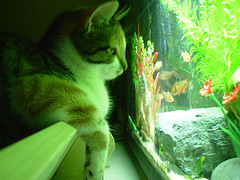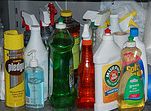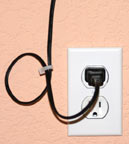Let Your Home be Aquarium-Proofed
Aquarium hazards at home are pretty much everywhere. It’s hard to avoid it unless you take proper precautions.
Some potential hazards are:
Here are some tips to help your aquarium and even the household members safe.
Children and your other pets

Some children are very active. They may tip an aquarium over when they are playing next to it. Others may find it amusing to climb on!
Others may try to put things in your aquarium like toys, their own food, and even your fish food or supplements.
So try to keep your aquarium supplies out of children’s reach.
Also talking about your aquarium tipping over, be sure that your aquarium has a sturdy stand as I mentioned on saltwater aquarium set up page.
It is also advisable to get a stand that is specifically manufactured for your aquarium.
Another potential aquarium hazards are your other pets at home. Cats, like the one on the picture, may find your fish very appetizing! So keep a tight and perfectly fitted lid on top of your aquarium to avoid feline divers in your tank.
Dogs may also have your aquarium tip over when they run around the aquarium. So again, be sure that the aquarium is on a sturdy stand to avoid danger to your fish and to your other pets as well.
Chemicals
Your hands and arms might have chemicals from lotion, soap, and other items on them. It is considered one of the aquarium hazards that should be taken very seriously. It can contaminate the aquarium water so always put on gloves if you are to put your hands inside an aquarium.
It is also a safe practice to wash your arms and hands after cleaning up your aquarium or after putting your hands in the aquarium water.
Recommendations on aquarium supplements, medications, salt, and other chemicals must be properly followed to avoid potentials risks. And do not forget to store your chemicals out of children’s and pets’ reach.
If you are using fluorescent bulbs for your lighting fixture in your aquarium, you should know that it contains mercury. Take the necessary care and precautions to prevent it from breaking.
Air Pollutions

Air pollution is often overlooked as one of the aquarium hazards.
Household cleaners and aerosols such as oven, wood, and glass cleaners are the most common. Air fresheners and deodorants also go on the list.
They actually release tiny drops of the chemical when you use it. Once it is used close to where your aquarium is at, they can enter the aquarium water. It can then be quickly turned into ammonia.
It will cause the water’s pH to drop. And can also cause stress on your aquarium’s inhabitants.
Another source of airborne toxin for your aquarium is using chemicals for pests control. Those chemicals stay in the air for a longer period of time. I would suggest moving the aquarium away from where you are using this kind of chemicals.
But it may not be possible for larger and heavily stocked saltwater aquariums.
So my best solution for all these is to simply avoid using them. If you need to use spray chemicals, spray it in the cloth itself to avoid putting it out in the air.
Electricity
When we talk about electricity and water, we just think that they are a very dangerous match! This is certainly one of the aquarium hazards that you should take a closer look to.

When you plug in your cords into an electrical outlet, it is safe to have part of the cord hanging below the outlet. It will prevent water to run down the cord directly to the outlet.
If you are using power strips, it is better if they are mounted vertically to reduce or even avoid the chance of water entering the strip.
Check all the wires regularly for any stips or breakage. Remember that when you perform partial water changes, to unplug or turn off everything that is connected to a power outlet.
I hope you learn from this article about aquarium hazards. If you have any comments, suggestion or if you’d like to add more on the list, feel free to contactme.
Water Supply
The next on my list of aquarium hazards is the source of your aquarium water. It can either be from:
- a pre-mixed and aerated water from your local aquarium store
- mixing your own saltwater using filtered water
- mixing your own saltwater using water from the tap
Using the third option, water may look crystal clear, but it may still contain levels of chemicals that are toxic to your fish. And tap water which comes from the city or municipal is treated with chlorine.
We all know that chlorine is toxic to fish and other aquarium inhabitants. Increase in ammonia and nitrite will occur once you use untreated city water during your water change.
Ammonia and nitrites are extremely toxic to the aquarium, and should always be maintained as close to zero as possible.
To treat chlorine in your water, try the following:
Conditioner
There are many available tap water conditioners nowadays online or in your local aquarium store.
No products found.
Aeration
You can simply aerate the water by using an air pump and stone for a couple of days before using it. The chlorine will evaporate into the air which will make the water safer to use in your aquarium.
No products found.
But note that this method will not remove any heavy metals that are in the tap water. This method is only suggested for use on water with low concentrations of these metals.
Purifying your water
This would be the best option to be on the safe side. This method will remove toxins and other impurities present in the tap water. It involves using a water purifier.
- Deionization Units: It will remove impurities as well as metals from the water. They are inexpensive but you have to change the cartridges often if you are to treat a large amount of water.
- Reverse Osmosis Units: They are the most efficient at removing a wide range of impurities from tap water. This method is perfect for an aquarium that is heavily stocked such as saltwater reef aquarium.
No products found.
- Deionization Units: It will remove impurities as well as metals from the water. They are inexpensive but you have to change the cartridges often if you are to treat a large amount of water.
Earthquake
Earthquake is one of the aquarium hazards are certainly unavoidable. Precaution must be taken if you live in areas where earthquakes are common.
Try getting an aquarium stand that has a lip on four sides and secures your aquarium. You can even bold the stand to the floor if you’d like to be safe.
Other aquatic experts say that acrylic tanks are less likely to break or leak than glass tanks in case an earthquake happens.
No products found.
Return from Aquarium Hazards to the Main Page
* Disclaimer: Saltwater-Aquarium-Online-Guide.com is a participant in the Amazon Services LLC Associates Program, an affiliate advertising program designed to provide a means for sites to earn advertising fees by advertising and linking to amazon.com, amazon.co.uk, amazon.ca. Amazon and the Amazon logo are trademarks of Amazon.com, Inc. or its affiliates. We may receive a small commission if you click on one of our links and make a purchase. Thank you for supporting Saltwater-Aquarium-Online-Guide.com and helping me make it the best site possible!
Last update on 2024-04-23 / Affiliate links / Images from Amazon Product Advertising API




